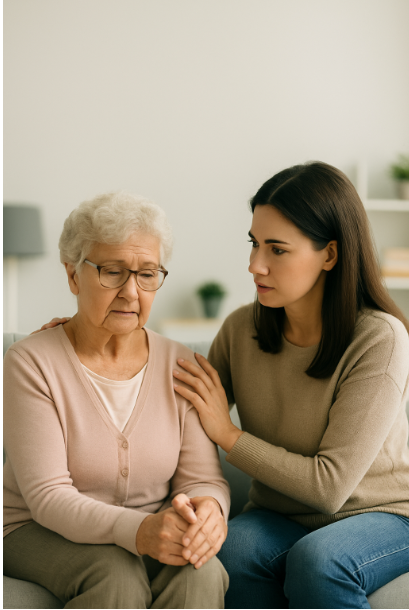When Your Parent Needs More Than You Can Give Alone

The phone call came at 3 AM. Your father had fallen again, this time unable to get back up. As you rushed over, a familiar knot formed in your stomach, the same one that’s been growing stronger each week. Between your demanding job, your own family responsibilities, and the increasing needs of your aging parent, you’re stretched beyond your limits. If this scenario sounds familiar, you’re not alone, and more importantly, recognizing that you might need to consider elder live-in care isn’t a failure, it’s wisdom.
Recognizing the Warning Signs
Sometimes the signs creep up gradually, making them easy to dismiss or rationalize away. Your mother misses a medication dose here and there, or your father seems a little more unsteady on his feet. But when these isolated incidents become patterns, it’s time to pay attention.
Physical indicators often tell the clearest story. Unexplained bruises may signal falls your parent hasn’t mentioned. Noticeable weight loss could indicate difficulty preparing meals or remembering to eat. Poor hygiene might suggest challenges with bathing or simply forgetting the importance of self-care. These aren’t signs of laziness or stubbornness—they’re indicators that your parent’s needs have evolved beyond their current support system.
Safety concerns present even more urgent red flags. Repeated falls, getting lost in familiar places, leaving the stove on, or struggling with stairs all signal that living independently may no longer be safe. Meanwhile, emotional changes like increased confusion, withdrawing from social activities, depression, or uncharacteristic agitation often accompany declining physical capabilities.
Perhaps most telling are your own warning signs. If you’re chronically exhausted from juggling caregiving with your other responsibilities, neglecting your spouse or children, missing work regularly, or experiencing health problems from stress, your current approach isn’t sustainable for anyone involved.
The Guilt and Fear Behind Seeking Help
The moment you consider getting professional help, the guilt often rushes in. “I should be able to handle this,” you tell yourself. “My parent raised me—now it’s my turn.” This thinking, while understandable, carries a dangerous assumption: that love is measured by how much you personally sacrifice.
Many adult children fear judgment from siblings, extended family, or their community. They worry about being seen as selfish or uncaring. There’s also the very real fear of losing control over their parent’s care, of handing over important decisions to strangers.
But here’s the truth that often gets lost in guilt: seeking professional help isn’t abandoning your parent—it’s ensuring they get the best possible care. Just as you wouldn’t perform your own surgery or represent yourself in court, caregiving at advanced levels requires specific skills, training, and availability that most loving children simply cannot provide alone.
Understanding Your Parent’s Perspective
Your parent likely shares many of your fears, often intensified by their vulnerable position. The desire to maintain independence and dignity runs deep, and accepting help can feel like admitting defeat. Many seniors have witnessed friends “being put away” in facilities and fear that any acceptance of help is a slippery slope toward losing their home and autonomy.
Your parent’s attachment to familiar surroundings goes beyond simple preference—it represents security, memories, and identity. Professional in-home care offers a way to honor these needs while ensuring safety and proper care.
Having honest conversations about changing needs requires patience and empathy. Focus on their goals and fears rather than your concerns. Ask what independence means to them and how you can work together to preserve as much of it as possible while ensuring their safety and health.
What Professional In-Home Care Really Looks Like
Professional in-home care extends far beyond basic assistance. Trained caregivers can handle personal care tasks like bathing, dressing, and grooming with dignity and expertise. They ensure proper nutrition through meal planning and preparation, and they manage complex medication schedules that many seniors struggle to maintain independently.
But perhaps equally important is the companionship and social interaction these professionals provide. Isolation is a serious health risk for seniors, and caregivers often become trusted companions who engage in conversation, encourage hobbies, and provide the social stimulation essential for mental health.
Safety monitoring represents another crucial component. Professional caregivers are trained in fall prevention, emergency response, and mobility assistance. They can recognize early warning signs of health changes and respond appropriately, often preventing serious incidents before they occur.
For families, professional care also means regular communication and coordination. Caregivers provide updates on your parent’s condition, work with healthcare providers, and adjust care plans as needs evolve. This professional oversight often catches problems early and ensures continuity of care that family members, despite their best intentions, might miss due to other obligations.
Making the Transition Work for Everyone
Introducing professional care requires sensitivity and patience. Start gradually, perhaps with a few hours a week for light housekeeping or companionship. This allows your parent to become comfortable with having someone in their home and builds trust slowly.
When possible, involve your parent in selecting their caregiver. Meeting candidates and having input in the decision helps maintain their sense of control and increases the likelihood of a positive relationship.
Set clear expectations from the beginning. Discuss which tasks the caregiver will handle, establish boundaries, and create routines that work for everyone. Remember, this transition changes your role from primary caregiver back to loving child—a shift that benefits everyone involved.
The Benefits You Might Not Expect
Professional care often brings unexpected improvements to your parent’s quality of life. Expert caregivers can encourage activities your parent may have given up, help them maintain social connections, and provide the consistent routine that many seniors crave. Many families are surprised to see their parent become more engaged and active with proper support.
For you, the benefits extend beyond simple relief. Peace of mind allows you to be present during your visits rather than constantly worrying about tasks and safety. Your relationship with your parent can return to its emotional foundation rather than being defined by care tasks. This often leads to better conversations, shared activities, and quality time that strengthens family bonds.
The ripple effects touch your entire family. Reduced stress improves your relationships with your spouse and children. You can return to being fully present at work and in your community. This isn’t selfishness—it’s creating a sustainable situation that serves everyone’s best interests.
Moving Forward with Confidence
Getting help for your aging parent isn’t giving up—it’s stepping up to ensure they receive the comprehensive, professional care they deserve. The loving choice is often the difficult choice, requiring you to set aside guilt and fear in favor of your parent’s wellbeing and safety.
Your parent’s needs will continue to evolve, and having professional support creates a foundation for adapting to those changes. More importantly, it allows you to remain their child, advocate, and source of emotional support rather than becoming overwhelmed by tasks that trained professionals can handle more effectively.
The decision to seek elder live-in care takes courage, but it opens the door to a more sustainable, healthier situation for everyone involved. Your parent gets expert care in familiar surroundings, you get peace of mind and restored family relationships, and everyone benefits from reduced stress and improved quality of life.
Taking this step isn’t about admitting defeat—it’s about recognizing that the best care sometimes requires a team approach, and the most loving thing you can do is ensure your parent has access to all the support they need to thrive safely at home.
Read Also: westernbusiness.co.uk



